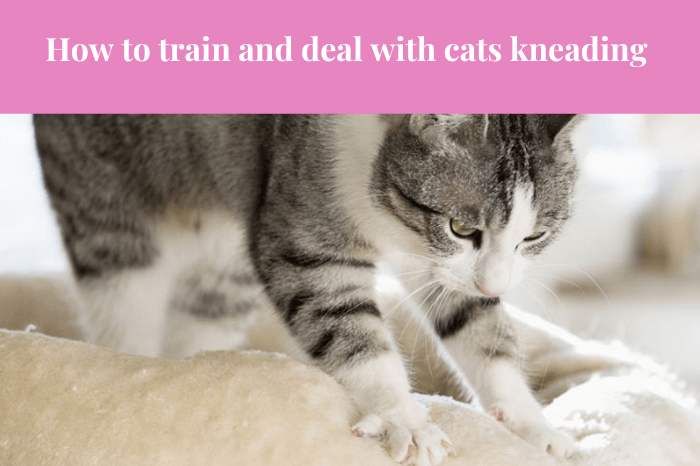If you have a cat, you may have noticed that they sometimes knead and bite blankets, pillows, or other soft items. This behavior may seem odd, but it has some explanations based on your cat’s instincts and emotions.
Why do cats knead and bite blankets? In this article, we will explore some of the reasons behind this behavior and discuss what you can do to ensure your feline friend remains comfortable and happy.
Contents
- 1 Why do cats knead and bite blankets?
- 2 What is kneading?
- 3 How to train and deal with cats kneading and biting blankets?
- 4 Why does my cat go into a trance when kneading?
- 5 Are cats sad and happy when they knead?
- 6 Why do male cats knead blankets?
- 7 Conclusion
- 8 FAQs: Why do cats knead and bite blankets?
Why do cats knead and bite blankets?
Biting blankets is another behavior that cats may exhibit when they are kneading. Cats may bite blankets for different reasons, depending on the context and the cat’s personality. Some possible reasons are:
Playfulness
Cats may bite blankets as a way of playing or having fun. They may see the blanket as a toy or a prey, and use their teeth and claws to interact with it. Cats are natural hunters, and they need to exercise their predatory instincts. Biting blankets may also help them keep their teeth and gums healthy and strong.
Frustration
Cats may bite blankets as a way of releasing frustration or stress. They may be bored, anxious, or unhappy with something in their environment, and biting blankets may help them cope with their emotions. Cats may also bite blankets as a way of getting attention from their owners, especially if they feel neglected or lonely.
Affection
Cats may bite blankets as a way of showing affection or bonding with their owners. They may see the blanket as an extension of their owner, and bite it gently to express their love. Cats may also bite blankets as a way of marking their territory or claiming their ownership. They may leave their scent or saliva on the blanket to let other cats know that it belongs to them.
What is kneading?
Kneading is a motion that cats make with their paws, alternating between pushing and pulling on a surface. Cats usually knead when they are relaxed, content, or feeling affectionate.
They may also purr, drool, or close their eyes while kneading. Kneading is a behavior that cats learn from their mothers when they are kittens. Kittens massage their mother’s abdomen to encourage the production of milk when they feed.
This creates a positive association between kneading and comfort, security, and love. Even when cats grow up, they may still knead to express these feelings or to soothe themselves.
How to train and deal with cats kneading and biting blankets?
Kneading and biting blankets are normal and harmless behaviors for cats, as long as they do not cause any damage or injury. However, some owners may find these behaviors annoying or inconvenient, especially if they ruin their blankets or disturb their sleep. If you want to discourage your cat from kneading and biting blankets, here are some tips:

Provide alternative outlets
Give your cat other ways to satisfy their needs and desires, such as toys, scratching posts, or interactive games. This will help them channel their energy and instincts into more appropriate activities, and reduce their boredom and frustration.
Redirect their attention
If your cat starts to curl up a blanket and bite it, try to distract them with something else, such as a treat, a toy, or a cuddle. This will help them associate the blanket with something less appealing, and break their habit.
Use positive reinforcement
Praise your cat when they knead and bite something else, such as a designated cat bed, a pillow, or a toy. This will help them learn what is acceptable and what is not, and reward them for their good behavior.
Avoid punishment
Do not scold, yell, or hit your cat when they knead and bite blankets. This will only make them scared, confused, or angry, and may worsen their behavior. Instead, use gentle and consistent methods to teach them what you want them to do.
Suggested: Why Do My Cats Lick Each Other?
Why does my cat go into a trance when kneading?
If you have ever seen your cat knead a blanket, a pillow, or your lap, you may have noticed that they sometimes seem to go into a trance-like state. They may close their eyes, purr, drool, or even fall asleep while kneading.
This behavior of curling up a blanket and biting it may look strange, but it indicates that your cat is feeling very relaxed and content. Kneading is a behavior that cats learn from their mothers when they are kittens.
Kittens massage their mother’s abdomen to encourage the production of milk when they feed. As a result, kneading becomes positively associated with warmth, safety, and affection.
Even when cats grow up, they may still knead to express these feelings or to soothe themselves. When your cat kneads, they are releasing endorphins, which are natural chemicals that make them feel happy and calm. This is why your cat may go into a trance when kneading, as they are enjoying the sensation and the memory of their mother.
Are cats sad and happy when they knead?
Kneading is a behavior that cats do with their paws, alternating between pushing and pulling on a surface. Cats usually knead when they are relaxed, content, or feeling affectionate.
They may also purr, drool, or close their eyes while kneading. Kneading is a behavior that cats learn from their mothers when they are kittens. When kittens nurse, they knead their mother’s belly to stimulate milk production.
This creates a positive association between kneading and comfort, security, and love. Even when cats grow up, they may still knead to express these feelings or to soothe themselves. Therefore, kneading is usually a sign that cats are happy and satisfied.
However, kneading can also be a way for cats to cope with stress or anxiety. Cats may knead to calm themselves down or to mark their territory. They may also want to get attention from their owners, especially if they feel lonely or neglected. In these cases, kneading may indicate that cats are sad, and they need more care and affection.
Why do male cats knead blankets?
Kneading is a behavior that cats do with their paws, alternating between pushing and pulling on a surface. Cats usually knead when they are relaxed, content, or feeling affectionate.
They may also purr, drool, or close their eyes while kneading. Kneading is a behavior that cats learn from their mothers when they are kittens. When kittens nurse, they knead their mother’s belly to stimulate milk production.
This creates a positive association between kneading and comfort, security, and love. Even when cats grow up, they may still knead to express these feelings or to soothe themselves. Male cats knead blankets for the same reasons as female cats.
They may knead blankets to show their happiness, bond with their owners, mark their territory, or relieve stress. Male cats may also knead blankets as a way of displaying their sexual maturity or readiness.
Male cats may knead blankets more often or more vigorously than female cats, especially if they are not neutered. This is because male cats have higher levels of testosterone, which can make them more aggressive or dominant.

Conclusion
Why do cats knead and bite blankets? its various reasons, such as playfulness, frustration, affection, or comfort. These behaviors of cat kneads blankets and purr are natural and instinctive for cats, and they usually do not mean any harm.
However, if you want to prevent your cat from kneading and biting blankets, you can try to provide them with alternative outlets, redirect their attention, use positive reinforcement, or avoid punishment.
By understanding and respecting your cat’s needs and emotions, you can help them live a happy and healthy life.
FAQs: Why do cats knead and bite blankets?
Q: What is kneading and biting behavior in cats?
- A: Kneading and biting behavior is when cats press their paws into soft surfaces, such as blankets, and sometimes bite or suck on them. This behavior is usually a sign of relaxation, comfort, or affection in cats.
Q: Why do cats knead and bite blankets?
- A: Cats knead and bite blankets for various reasons, such as:
- To express their happiness, contentment, or love for their owners or the blanket.
- To mark their territory or claim their ownership of the blanket, using the scent glands in their paws.
- To stimulate milk production from their mother when they are kittens, which creates a positive association between kneading and comfort, security, and love.
- To release stress, frustration, or boredom, or to get attention from their owners.
- To display their sexual maturity or readiness, especially in male cats that are not neutered.
Q: How to stop cats from kneading and biting blankets?
- A: Kneading and biting blankets are normal and harmless behaviors for cats, as long as they do not cause any damage or injury. However, some owners may find these behaviors annoying or inconvenient, especially if they ruin their blankets or disturb their sleep. If you want to discourage your cat from kneading and biting blankets, here are some tips:
- Provide alternative outlets: Give your cat other ways to satisfy their needs and desires, such as toys, scratching posts, or interactive games. This will help them channel their energy and instincts into more appropriate activities, and reduce their boredom and frustration.
- Redirect their attention: If your cat starts to knead and bite blankets, try to distract them with something else, such as a treat, a toy, or a cuddle. This will help them associate the blanket with something less appealing, and break their habit.
- Use positive reinforcement: Praise your cat when they knead and bite something else, such as a designated cat bed, a pillow, or a toy. This will help them learn what is acceptable and what is not, and reward them for their good behavior.
- Avoid punishment: Do not scold, yell, or hit your cat when they knead and bite blankets. This will only make them scared, confused, or angry, and may worsen their behavior. Instead, use gentle and consistent methods to teach them what you want them to do.
Q: Is kneading and biting blankets a sign of illness in cats?
- A: Kneading and biting blankets are usually not a sign of illness in cats unless they are accompanied by other symptoms, such as weight loss, vomiting, diarrhea, lethargy, or changes in appetite, thirst, or urination. If you notice any of these signs, you should consult your veterinarian as soon as possible. However, if your cat is only kneading and biting blankets, and otherwise seems healthy and happy, there is no need to worry.
Q: What are the benefits of kneading and biting blankets for cats?
- A: Kneading and biting blankets can have some benefits for cats, such as:
- Improving their mood and well-being, by releasing endorphins, which are natural chemicals that make them feel happy and calm.
- Strengthening their bond with their owners, by showing their affection and trust.
- Keeping their teeth and gums healthy and strong, by biting and chewing on the blanket.
- Exercising their muscles and joints, by kneading and stretching their paws.




